 Petzlover
Petzlover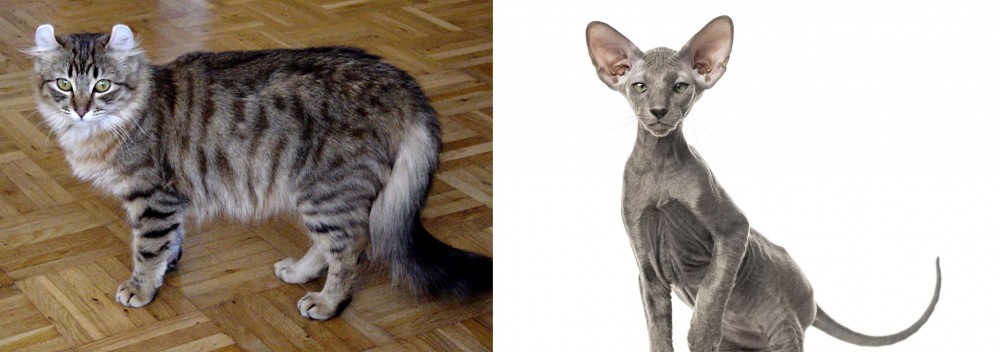 American Curl is originated from United States but Peterbald is originated from Russia. Both American Curl and Peterbald are having almost same weight. Both American Curl and Peterbald has same life span. Both American Curl and Peterbald has same litter size. Both American Curl and Peterbald requires Moderate Maintenance.
American Curl is originated from United States but Peterbald is originated from Russia. Both American Curl and Peterbald are having almost same weight. Both American Curl and Peterbald has same life span. Both American Curl and Peterbald has same litter size. Both American Curl and Peterbald requires Moderate Maintenance.
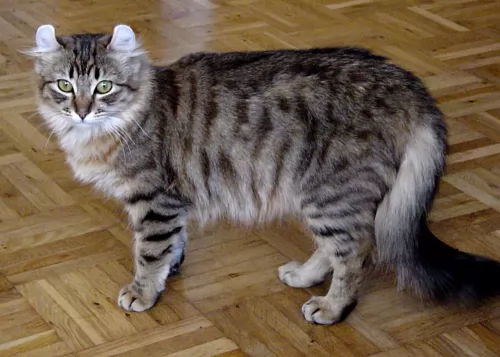 The American Curl is well known for its unusual shaped ears and for being one of the youngest cat breeds.
The American Curl is well known for its unusual shaped ears and for being one of the youngest cat breeds.
It developed in California. The first of these cats appeared to have been strays that arrived in California in 1981. The black female’s name was Shulamith, and she gave birth to a litter with the same curled ears, and was the ancestor of the American Curls of today.
Appearing in a cat show in 1992 for the first time, the longhaired American Curl was then given championship status by TICA and it was also admitted to the Cat Fanciers Association’s championship class in the long- and shorthaired divisions.
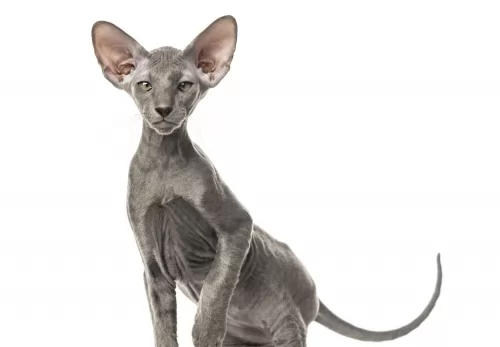 As a newer and rare cat breed, the Peterbald cat’s history is somewhat limited.
As a newer and rare cat breed, the Peterbald cat’s history is somewhat limited.
The breed was first developed in 1994, when a Russian breeder named Olga S. Mironova crossed an Oriental Shorthair cat with a Don Sphynx cat. This cat was to be known as the Peterbald.
The Peterbald cat is recognized by the Cat Fanciers Association. It was also accepted by The International Cat Association in 1997.
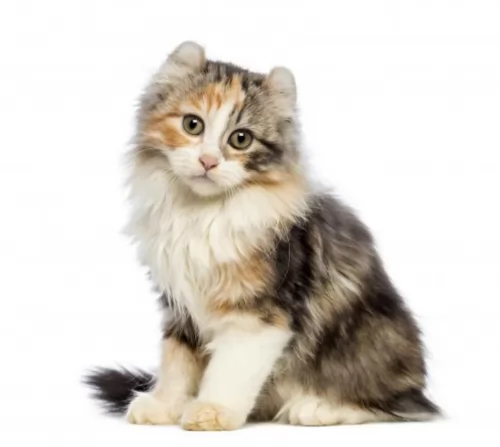 The American Curl is a medium-sized cat weighing roughly 2.3–4.5kg. Its a cat that stands between 21 and 27cm in height.
The American Curl is a medium-sized cat weighing roughly 2.3–4.5kg. Its a cat that stands between 21 and 27cm in height.
It’s also a cat that takes a fairly long time to mature, reaching maturity about 2 or 3 years of age. The most distinctive feature of this cat is its unusual ears that curl backward as opposed to standing up like most other cats. At birth the ears are straight but they gradually start curling back, staying in a tight bud position.
The American Curl's coat is soft and silky and doesn’t require too much grooming. The fur comes in colors such as grey, white, apricot, black, and the coat can be a solid color or in a host of different patterns such as bi-color, triple-color, tabby, ticking and others.
The head is round, the eyes of the cat are large, giving the cat an alert, friendly look. The eyes can be many different colors from blue to green, amber, copper, hazel, and yellow.
The American Curl Cat loves his human family and gets on well with children too. He is an adaptable cat, settling into different lifestyles. You’ve got to watch him around small children who might manhandle him and pull his sensitive ears.
Nonetheless, he is sociable and loving. He is an intelligent cat, being active and alert and will even follow you around to see what you’re doing that he can be involved in too. He isn’t a particularly talkative breed but he loves to play and can even learn to fetch a smallish ball.
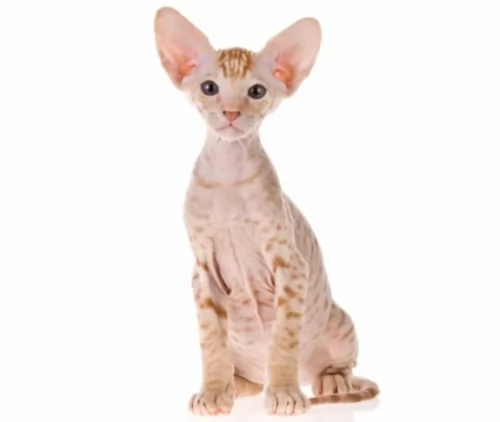 Looking a little bit futuristic, with a long, narrow head, almond-shaped eyes and large, pointed ears, the medium-sized, slimly built Peterbald cat can weigh between 3 and 6kg and is essentially a hairless cat.
Looking a little bit futuristic, with a long, narrow head, almond-shaped eyes and large, pointed ears, the medium-sized, slimly built Peterbald cat can weigh between 3 and 6kg and is essentially a hairless cat.
Although Peterbalds are considered a cat breed that are essentially hairless, not all of them are hairless as there are some that have a very short coat. There are some that are born with quite a bit of hair but they lose this.
In fact, their coat color as well as certain markings can be in various shades and patterns.
Peterbalds are easy-going, social cats with a sweet nature. They are affectionate towards their human companions and are quite vocal too, liking to talk to their owners. They are active and playful and enjoy playing with children and even other pets in the home.
In fact, they are adaptable cats and will slot into different home environments and lifestyles. The hairless variety is best as an indoor cat and this is why they suit living in apartments as well.
They are independent and intelligent, and people who have owned them say their pets often behave like a dog, wanting to be involved in their human's activities.
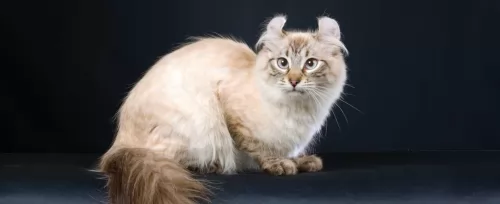 You’ll find your American Curl to be a friendly, loving cat that will easily bond with his human family. They’re adaptable cats and will happily adjust to your lifestyle.
You’ll find your American Curl to be a friendly, loving cat that will easily bond with his human family. They’re adaptable cats and will happily adjust to your lifestyle.
Despite their affection, however, American Curls aren't the type of cats to want to be pampered and petted - they are quite happy just to sit next to their owner and relax, or play with their toys.
Because American Curls are highly adaptable, they're suitable for a number of different home types, and homes with other pets or children, making you a splendid feline pet and companion.
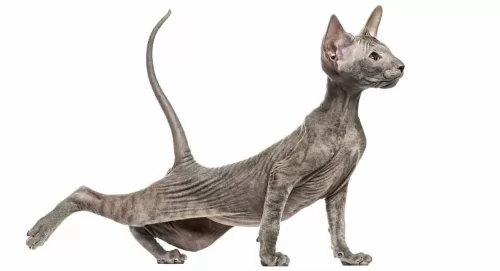 These Peterbalds are very intelligent cats and also very affectionate with their human owners. They are always up for a game and are playful and social.
These Peterbalds are very intelligent cats and also very affectionate with their human owners. They are always up for a game and are playful and social.
While they make excellent family pets and companions, one just has to take special precautions with the hairless variety and ensure that they don't become too hot or too cold.
They’re balanced in nature and adapt to the different human personalities in the household as long as its human owners are kind and respectful towards animals. With the right level of love, kindness and respect, they become ideal companions.
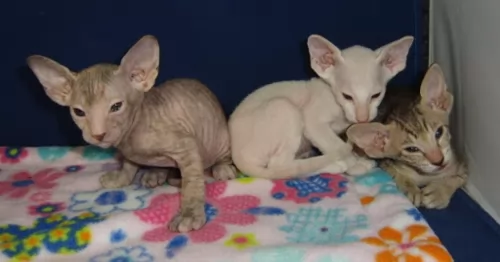 One of the more obvious things to watch out for with this particular cat is his hairlessness. This means he is more susceptible to the cold as well as to the heat. If he is outdoors, you have to be careful with his skin as it could get burned. Rough play with children could also cause scratching of the sensitive skin.
One of the more obvious things to watch out for with this particular cat is his hairlessness. This means he is more susceptible to the cold as well as to the heat. If he is outdoors, you have to be careful with his skin as it could get burned. Rough play with children could also cause scratching of the sensitive skin.
This particular cat is a fairly new breed and so there are few genetically inherited problems to be careful of.
Their large ears might prove to be a problem, and you will need to check the interiors and see that they remain clean. Also, trim his claws. If you fear that you could hurt your cat while attempting to groom him, rather take him along to professional, reputable pet groomers or have your vet do these grooming processes for you.
Whenever your Peterbald is sick you will need to get him to the vet. As it is, as a kitten, he will need to be taken to the vet to have his regular vaccines to protect him from some of the deadly cat diseases there are.
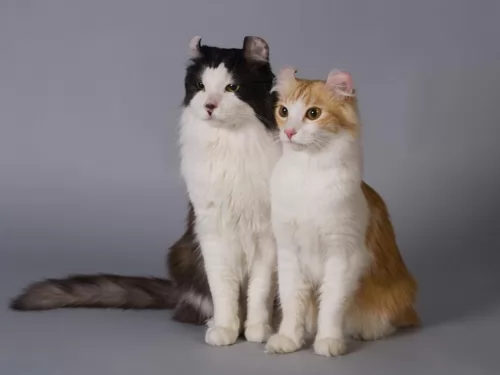 The Curl’s coat can be either short or long, but with a gentle brushing, the coat can be well maintained. The shorthaired variety sheds a bit more during the year than the longhaired variety and this is why grooming and brushing becomes necessary.
The Curl’s coat can be either short or long, but with a gentle brushing, the coat can be well maintained. The shorthaired variety sheds a bit more during the year than the longhaired variety and this is why grooming and brushing becomes necessary.
You can brush your cat’s teeth to avoid periodontal disease.
Trim your cat’s nails every other week if they don’t wear down naturally.
Check inside- and outside the cat’s ears for parasites and dirt. The cat’s ears have a unique shape and they may well be born with narrowed ear canals that can trap dirt and wax and this results in ear infections.
Like all cats breeds, your lean, muscular American Curl can be susceptible to obesity and heart disease. Speak to your vet about a special cat food for your feline friend as cat food is specially formulated to deliver the exact level of natural vitamins, minerals, fiber and antioxidants needed. Understand the amount of food your Curl requires by checking out the feeding instructions on the food labels. Always talk to your vet if you're not sure how much and what you should feed your cat.
Remember, that if you don’t want to do these grooming routines for your cat for fear of hurting him or not doing it properly, the vet or your local pet groomer will do it for you.
Make sure to provide your intelligent American Curl with toys and exercise. You can buy toys and games that will challenge his mental and physical abilities.
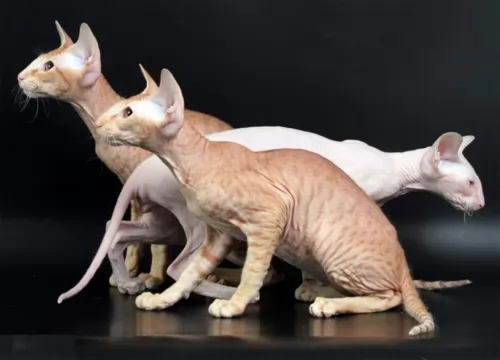 The Peterbald cat with its little or no hair is considered to be a low-maintenance cat. Their owners don’t have to worry about excessive shedding. Bathing these cats is important so that oils don't build up and cause skin irritation.
The Peterbald cat with its little or no hair is considered to be a low-maintenance cat. Their owners don’t have to worry about excessive shedding. Bathing these cats is important so that oils don't build up and cause skin irritation.
These cats are also best as indoor cats, but then again, some gentle sunshine on the skin will do him the world of good, and he loves the feel of the warm sun.
There are some Peterbald cat owners who gently bath their cats, sometimes once a week to get rid of the oil on the skin. If it isn’t possible to bath your cat, check out at your local vet as you do get special wipes for these cats that are effective in removing dirt and oil.
Also, speak to your vet about skincare and the possibility of moisturizing creams specially made for these cats and which are gentle and non-toxic.
This is a slim, athletic cat, and like all other cats, you have to be careful about weight issues. Any amount of weight with this cat can bring on a host of health issues such as extra pressure on the joints, not to mention other weight-related diseases such as diabetes and heart disease.